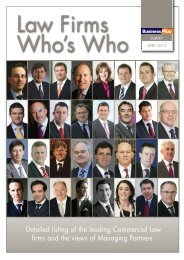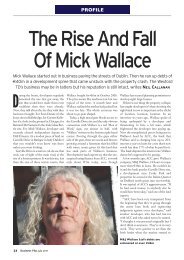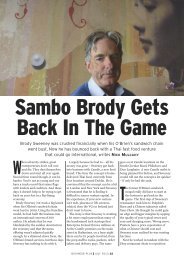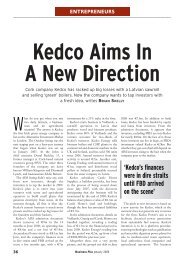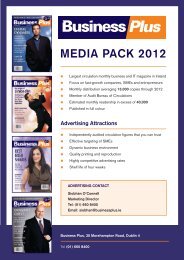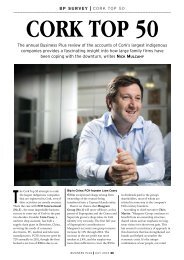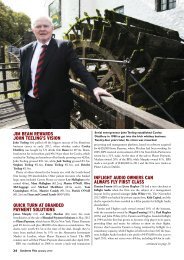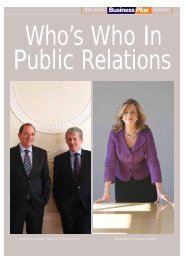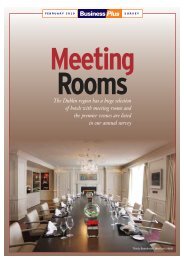Download - Business Plus Online
Download - Business Plus Online
Download - Business Plus Online
You also want an ePaper? Increase the reach of your titles
YUMPU automatically turns print PDFs into web optimized ePapers that Google loves.
MARCH 2012<br />
SURVEY<br />
Accountants<br />
Who’s Who<br />
Detailed Listing of Ireland’s<br />
Top Accountancy Firms<br />
and the Views of<br />
Managing Partners
Accountants Confront<br />
Competitive Pressures<br />
Fee income for leading accountancy firms has generally stabilised over the<br />
past year, though firms outside the Big Four have to scrap over a smaller cake.<br />
CHRIS SPARKS reports on what managing partners are saying about<br />
current trading and the prospects for the coming year<br />
Ireland’s top accountancy firms stabilised<br />
their fee income in 2011 after falls of<br />
10% in 2010 and 5% in 2008-09. The<br />
market is dominated by four firms –<br />
PwC, KPMG, Deloitte and Ernst &<br />
Young – with these multinational giants<br />
accounting for around 80% of the total<br />
fee income generated by the Top 20<br />
accountancy practices in Ireland. While<br />
all the leading players and the mid-size<br />
and smaller firms face pricing pressure<br />
from clients, generally there is optimism<br />
that 2012 will deliver a better outcome<br />
than last year.<br />
According to Terence O’Rourke,<br />
managing partner of KPMG, technology,<br />
food, drink, agriculture and renewables<br />
are among the sectors showing resilience<br />
and even good growth in cases. “The<br />
private and family-owned businesses we<br />
work with have also shown remarkable<br />
resilience and are driven to come out of<br />
this recession stronger and in better<br />
shape,” says O’Rourke. “In 2011, there<br />
was a strong level of demand for what we<br />
do, in what was a really tough year for<br />
Irish business. I expect this demand will<br />
continue in 2012.”<br />
O’Rourke adds that KPMG clients are<br />
looking for support in reducing costs and<br />
getting a real handle on opportunities,<br />
especially in exploiting export markets or<br />
in areas where they need to restructure or<br />
refinance their business. “We are also<br />
beginning to see projects emerging from<br />
the high-growth BRIC markets that over<br />
time may convert into a significant<br />
revenue stream.”<br />
O’Rourke describes the current state of<br />
the accountancy market as very competitive.<br />
“There is a reasonable level of tender<br />
activity across all services, as clients rightly<br />
shop around for value for money. In almost<br />
all assignments, clients have a genuine<br />
choice in terms of who to appoint.” And he<br />
is upbeat about the prospects for young<br />
people entering the profession. “We are<br />
hiring graduates and experienced<br />
professionals because for the right people<br />
there are genuine opportu-nities to<br />
support our clients. They are looking to do<br />
things quicker, better, more costeffectively,<br />
and they need help in doing so.”<br />
Brendan Jennings, the newly appointed<br />
managing partner of Deloitte, believes<br />
that there are opportunities for growth in<br />
Brendan Jennings, Deloitte:“We do<br />
more work for less”
2012. “In particular, our multidimensional<br />
approach to addressing client issues, using<br />
our combined knowledge across all service<br />
lines to evaluate them in a ‘big picture’<br />
context, will help us capitalise on market<br />
opportunities,” says Jennings.<br />
Services in demand at Deloitte over the<br />
past year include restructuring and debt<br />
advisory, regulation and compliance, and<br />
business transformation and business<br />
analytics. The Big Four firm purchased<br />
Curach Consulting in late 2010, adding to<br />
the practice’s technology consulting<br />
capabilities. “This is also an area in which<br />
we are seeing an increased demand for<br />
services and we are actively recruiting for<br />
it,” says Jennings. “Organisations are<br />
increasingly looking to capitalise on the<br />
efficiencies that innovative technologies<br />
can bring.”<br />
Jennings insists that competition in the<br />
sector is intense. “Today, we do more work<br />
for less, compared to four or five years<br />
ago. That said, organisations are<br />
beginning to recognise how firms such as<br />
ours can add real value to their business, as<br />
well as providing support and help to their<br />
‘Clients have a<br />
genuine choice in<br />
terms of who to<br />
appoint’<br />
strategic plans.” According to Jennings,<br />
Deloitte currently has around 40 vacancies<br />
for experienced hires. Last year, the firm<br />
offered 215 graduate positions, which was<br />
a significant increase on the previous year.<br />
Mike McKerr, managing partner of<br />
Ernst & Young, says the firm traded<br />
strongly in 2011, experiencing doubledigit<br />
revenue growth in revenue. “We<br />
anticipate this trend to continue in 2012,”<br />
says McKerr. “We have experienced<br />
growth across all service lines: assurance,<br />
tax, transactions advisory services and<br />
advisory. As a result, we are in the process<br />
of recruiting 300 more people, including<br />
graduate trainees and experienced hires.<br />
Our transaction and advisory teams are<br />
performing exceptionally strongly, due to<br />
increased demand for corporate recovery<br />
services, working capital and cost<br />
reduction advice.”<br />
McKerr adds that new rules around<br />
transfer pricing have generated extra work<br />
for the firm’s tax advisers, while clients are<br />
also seeking counsel as to how best to take<br />
advantage of revised R&D tax policies.<br />
“Pricing pressure remains a very real issue<br />
for us and our clients and this will likely<br />
continue through the next financial year,<br />
albeit at a much slower rate,” says McKerr.<br />
“While price is key, quality, experience<br />
and expertise must all still be put at the<br />
centre of our service offering.”<br />
He adds: “Our integration into an<br />
EMEIA partnership has allowed the Irish<br />
practice to provide differential service to<br />
international and indigenous clients and to<br />
capitalise on continued growth in<br />
emerging markets. It also allows the Irish<br />
arm of Ernst & Young to make counter<br />
cyclical investments, which positions us to<br />
emerge from recession in a strong<br />
position.”<br />
continued on page 54<br />
Local Expertise<br />
International Reach<br />
For all audit, tax or advisory needs please contact us at one of the numbers below:<br />
Dublin 01 418 2000 • Longford 043 334 1900 www.rsmfarrellgrantsparks.ie<br />
Registered to carry on audit work and authorised to carry on investment business by the Institute of Chartered Accountants in Ireland (ICAI). Chartered Accountants Ireland is the operating name of ICAI. RSM Farrell Grant<br />
Sparks is a member of the RSM International network. The RSM International network is a network of independent accounting and consulting firms each of which practices in its own right. RSM International is the brand used<br />
by the network which is not itself a separate legal entity in any jurisdiction. © RSM Farrell Grant Sparks 2012
Jim Mulqueen, managing partner of<br />
RSM Farrell Grant Sparks, describes<br />
trading conditions in 2011 as tough. He<br />
explains: “While all service lines showed<br />
some degree of uplift, corporate recovery<br />
and insolvency continued its strong<br />
growth performance. We were pleased<br />
with some significant business wins during<br />
2011 and are projecting top and bottom<br />
line growth for 2012, although we feel that<br />
any gains will be hard won in current<br />
market conditions.”<br />
The firm restructured its service<br />
offerings a few years ago, with a significant<br />
investment in the corporate recovery<br />
team. “Our audit business has also grown<br />
in volume terms in the past year and there<br />
was a reasonable pick-up in corporate<br />
finance activity in the second half of last<br />
year,” says Mulqueen. He adds that price is<br />
always a key factor in winning new work<br />
that is put out to tender. “However it is<br />
important for clients to understand that<br />
quality of service can be adversely affected<br />
below a certain fee level,” he says.<br />
“At another level, the market can be very<br />
uncompetitive, particularly with respect to<br />
audit quotes, as some firms are inclined to<br />
significantly undercut to maintain existing<br />
clients or win new key ones. That is fine so<br />
long as this is not being done with a view<br />
to being in the frame for other consulting<br />
fees from the same clients, as this can lead<br />
to significant audit independence issues.<br />
We would prefer to see more transparency<br />
in this area and we welcome the recent EU<br />
Commission’s proposals which seek to<br />
address this issue.”<br />
Derry Gray, managing partner of BDO,<br />
describes trading through 2011 as<br />
relatively flat, though he expects business<br />
to increase in 2012. “We are investing in<br />
areas that are growing, such as insolvency<br />
and internal audit, outsourcing and<br />
consulting,” says Gray. “We have seen a<br />
surge in demand for outsourcing and<br />
payroll services, specifically when linked<br />
to FDI investment in Ireland. Other areas<br />
of note would be consulting and work-out<br />
solutions.”<br />
In Gray’s opinion, one of the<br />
consequences of the recession is that<br />
there are too many accountancy firms<br />
competing for too little work. “The<br />
market remains extremely competitive<br />
and the pool of potential clients is<br />
significantly reduced from four or five<br />
years ago,” he says. “I believe that the<br />
sector requires a level of merger and<br />
consolidation activity over the coming<br />
years to right-size the industry. Fee<br />
pressure is a huge issue within the<br />
profession. There is a twofold effect from<br />
this pressure on firms: some are unable to<br />
maintain employment levels, while others<br />
are unable to offer as many opportunities<br />
as before to new entrants.”<br />
However, Gray says BDO is continuing<br />
to hire graduates. “Our manpower<br />
structure and planning requires an annual<br />
intake of trainee accountants and tax<br />
trainees. So despite the economic<br />
downturn, over recent years we have<br />
continued to recruit. Our numbers were<br />
slightly reduced in 2009 and 2010, but in
2011 we had a strong graduate<br />
recruitment campaign. We aim to hire<br />
even more graduates in 2012.”<br />
Andy Quinn, recently appointed<br />
managing partner of Moore Stephens<br />
Nathans, says the practice traded at a<br />
better level in 2011 than in 2010. “We are<br />
budgeting for a further increase for 2012,”<br />
says Quinn. “This has been the result of<br />
creating new revenue streams to replace<br />
some of the traditional areas of our<br />
business that have been in decline or have<br />
been subject to downward fee pressure.”<br />
Quinn explains that the firm’s financial<br />
and regulatory services division, along<br />
with insolvency and recovery, has been<br />
growing, compensating for the downward<br />
fee pressures on the traditional<br />
compliance areas of the practice. Moore<br />
Stephens Nathans has also enjoyed an<br />
increase in FDI-related activity, as the firm<br />
has developed a niche in the medical<br />
services area. Quinn adds: “We are hiring<br />
to support growth in key areas. The main<br />
difficulty is getting the people who are<br />
technically capable and astute and who<br />
also have a commercial perspective.”<br />
In terms of fee income, Baker Tilly<br />
Ryan Glennon is now among the top 10<br />
accountancy firms in Ireland, improving<br />
its ranking position by two places in the<br />
annual Finance magazine survey of the<br />
sector. The firm currently has a headcount<br />
of 90 people and there are seven vacancies.<br />
Managing partner John Glennon<br />
Derry Gray:“Fee pressure is a huge issue”<br />
attributes recent growth to activity in<br />
corporate recovery and restructuring,<br />
together with increased activity in the<br />
firm’s HR, outsourcing and process<br />
improvement service areas. “We expect to<br />
grow in these areas throughout 2012 as we<br />
continue to help our clients restructure<br />
their operations and strategies.”<br />
Glennon adds: “Clients are discerning<br />
buyers and they are looking for innovative<br />
and integrated solutions, value for money,<br />
quality service, depth of expertise and a<br />
business partnership that can make a<br />
difference to their bottom line and their<br />
future strategies.” He says that the firm’s<br />
corporate finance team is now more<br />
involved in re-engineering businesses and<br />
finding new ways of sourcing financing.<br />
The firm has also geared up for the<br />
imminent changes to the personal<br />
insolvency regime, drawing on the<br />
resources of the practice’s sister firm in the<br />
UK.<br />
“Our performance improvement and<br />
HR consulting service offerings are in<br />
growth mode and we have invested in<br />
developing our expertise in these areas to<br />
meet the demand,” says Glennon. “We<br />
have also built up a really strong<br />
Alternative Dispute Resolution unit.<br />
Clients want a cost-effective way of<br />
resolving disputes early on, both in the<br />
commercial arena and in the workplace,<br />
not just to avoid costly litigation but also to<br />
focus on strategy and bottom-line issues.”<br />
Glennon describes audit and assurance<br />
work as “very competitive”, with a<br />
continuing trend towards reduction in fee<br />
levels. He says tax consulting work is<br />
continued on page 56<br />
Seminar Series<br />
Spring 2012<br />
Stay informed on industry<br />
issues by registering to attend<br />
updates from KPMG professionals<br />
Register at<br />
www.kpmg.ie/seminars2012<br />
© 2012 KPMG, an Irish partnership and a member firm of the KPMG network of independent<br />
member firms affiliated with KPMG International Cooperative (“KPMG International”), a Swiss<br />
entity. The KPMG name, logo and “cutting through complexity” are registered trademarks of<br />
KPMG International Cooperative (“KPMG International”), a Swiss entity. All rights reserved.
Tom Fitzpatrick:“Increased demand<br />
for insolvency services”<br />
buoyant, as individuals and companies<br />
seek to ensure that their existing structures<br />
are fit for purpose following the credit<br />
crash and the significant taxation changes<br />
of recent years.<br />
At OSK, clients are focused on costeffective<br />
compliance services and valueadded<br />
services like tax planning and<br />
business advisory, according to managing<br />
partner Tadhg O’Sullivan. “The practice<br />
traded well over the past year, with some<br />
areas of growth compensating for the<br />
decreasing areas,” says O’Sullivan. “The<br />
areas that are resilient and showing<br />
growth are the niche areas of expertise.<br />
The market for accountancy services is<br />
very competitive at present and there is<br />
pressure on fee levels and cash collections.<br />
However, clients are still willing to pay<br />
reasonable fees for services where they can<br />
see a direct cost or tax saving.”<br />
Tom Fitzpatrick, managing partner at<br />
chartered accountants FMB, says that<br />
practice fee income in 2011 held its own<br />
against the 2010 outcome. “I expect that in<br />
2012 we will continue to make progress,<br />
56 <strong>Business</strong> <strong>Plus</strong> March 2012<br />
notwithstanding the difficult challenges<br />
ahead,” says Fitzpatrick. “We are spending<br />
more time working with clients dealing<br />
with the business strategies to counter the<br />
effects of the recession, and are putting<br />
more resources into dealing with the<br />
increased demand for insolvency services.”<br />
Fiztpatrick adds that requests for fee<br />
reductions by clients, which were a<br />
feature of 2009 and 2010, appear to have<br />
reduced somewhat. “In general our fees<br />
are at a very competitive level and, oddly<br />
enough, it is only at the very small<br />
business level that we have noticed<br />
competitors offering fees at what we view<br />
to be an uneconomic level.”<br />
Gerry McInerney of McInerney<br />
Saunders says his firm is targeting growth<br />
for 2012 through a combination of<br />
business from new clients and an increase<br />
in corporate services and insolvency<br />
business. He adds: “Traditional<br />
compliance services continue to dominate<br />
and we have focused on offering our<br />
clients an opportunity to control their<br />
costs though assisting them in being more<br />
self-reliant, while at the same time being<br />
there to support them when required.<br />
“We have also become more involved<br />
with our clients in providing them with<br />
advisory and support services around<br />
defining their goals, identifying the<br />
barriers preventing their achievement and<br />
facilitating them in unblocking these<br />
barriers. We find that clients expect value<br />
for money services from their trusted<br />
business advisers and that is the market<br />
that we serve.”<br />
Jim Stafford, partner at insolvency<br />
specialist Friel Stafford, says there is<br />
buoyant demand for the firm’s<br />
receivership and personal bankruptcy<br />
services. He adds: “One service that we<br />
always provided was tracing assets that<br />
debtors may have hidden. There is now a<br />
massive demand from banks for assettracing<br />
services. We completed a<br />
recruitment drive late last year and we<br />
recently added 60% of office space to<br />
cope with the extra staff. We will recruit<br />
more staff as soon as the new personal<br />
insolvency legislation is implemented, as<br />
there is a pent-up demand for solutions to<br />
the massive borrowings that many people<br />
have.”<br />
Tony Carey, one of the principals at<br />
Cooney Carey, expects that business<br />
activity for most accountants should<br />
increase in 2012 and the firm is in<br />
recruitment mode. “We are investing in<br />
new hires and have done so throughout<br />
the last couple of years,” says Carey.<br />
“Despite a tightening of liquidity, more<br />
advice and service is required by clients. A<br />
few years ago, advisory services were<br />
focused on development. Now they are<br />
focused on restructure and recovery. The<br />
roots of our firm are in this area and we<br />
were well equipped to adjust.”<br />
Carey’s view is that the market is overly<br />
competitive in the recurring service areas<br />
such as audit and compliance taxation.<br />
However, the market for consultancy<br />
services is less price sensitive. He adds:<br />
“Care has to be taken by business to obtain<br />
good value from competent service<br />
providers, but not to jeopardise a<br />
relationship that provides excellent,<br />
relevant advice when needed, based on a<br />
thorough understanding gained over<br />
many years. A wise business will recognise<br />
that the best advice, rather than the lowest<br />
price, is the cheapest option.”<br />
The growth in cloud computing is<br />
enabling accountancy firms to get<br />
closer to their clients. There are<br />
many accountancy software solutions<br />
available now that allow companies and<br />
their accountants to view financial<br />
information simultaneously. Chartered<br />
accountants Anne Brady McQuillans<br />
DFK was the first Irish practice to go fully<br />
virtual in 2010. According to William<br />
Kingston, corporate governance and IT<br />
manager: “This has had a positive impact<br />
on our costs and business model and we<br />
have been pleasantly surprised by the<br />
range of benefits cloud computing has<br />
provided.<br />
“Firstly, it gives our staff fantastic<br />
flexibility by being able to access their<br />
applications and data from any location<br />
using almost any device. It has also<br />
removed a number of headaches from the<br />
organisation such as backups, anti-virus,<br />
disaster recovery and the general<br />
vulnerability associated with running our<br />
servers on-site. This also frees up time for<br />
us to focus on core business activities,<br />
which directly impact our bottom line.<br />
The cost of running IT has been<br />
dramatically reduced because we have<br />
replaced cyclical capital expenditure with a<br />
lower operating expense.”<br />
Survey continued on page 58
In times when most<br />
are concerned<br />
<br />
is it possible to<br />
swim harder<br />
Spotting new opportunities<br />
<br />
struggling to maintain<br />
<br />
challenging. Our Growing<br />
Beyond programme reveals<br />
how the most successful<br />
organisations are expanding<br />
<br />
innovation and nurturing talent<br />
to help them grow — even in the<br />
toughest conditions. Find out<br />
more at ey.com/growingbeyond.<br />
See More | Growth<br />
© 2012 Ernst & Young Ireland. All Rights Reserved.
BP SURVEY<br />
Accountants<br />
‘We have seen no material improvement in the<br />
availability of credit to the SME sector’<br />
Nobody knows better than accountants about how the economy is performing<br />
and the issues facing large and small businesses. NICK MULCAHY canvassed<br />
managing partners for their insight into liquidity, credit conditions<br />
and prospects for the economy in 2012<br />
Mike McKerr<br />
Ernst & Young<br />
Our forecasts<br />
show<br />
economic<br />
growth<br />
struggling at<br />
just 0.5% in<br />
2012, largely<br />
as a result of<br />
weak domestic<br />
conditions and<br />
falling<br />
demand for<br />
exports.<br />
However, our<br />
forecasts<br />
indicate<br />
Mike McKerr,<br />
Ernst & Young<br />
Ireland will perform strongly in 2013,<br />
with GDP growth picking up to an<br />
average of 4.1% per annum over the<br />
period to 2020, as the economy’s core<br />
strengths come to the fore once more.<br />
Our exports remain remarkably resilient<br />
and have grown at a time when countries<br />
including France and Germany saw their<br />
exports decline.<br />
Liquidity and credit conditions for<br />
SMEs have changed very little over the<br />
past 12 months. <strong>Business</strong>es that<br />
performed well last year, and continue to<br />
perform well this year, are still accessing<br />
credit to some extent, particularly from<br />
foreign banks. <strong>Business</strong>es that are still<br />
seen as ‘unbankable’ 12 months on<br />
continue to struggle to access credit.<br />
Liquidity for SMEs is generally far<br />
worse than for multinationals, not just in<br />
terms of access to growth capital but also<br />
in terms of accessing working capital,<br />
which is the lifeblood for any successful<br />
business.<br />
There has been a real and rapid<br />
improvement in the cost competitiveness<br />
of Irish businesses, reversing the trend<br />
observed in the years since adopting the<br />
euro. Many Irish businesses are<br />
expanding their horizons by breaking<br />
into new markets. We are seeing<br />
successful entrepreneurs taking existing<br />
generations of products and applying<br />
them to emerging markets, while<br />
continuing to innovate with nextgenerations<br />
in markets closer to home.<br />
Last December, Ernst & Young<br />
presented its findings to the G20 on the<br />
best approach for governments to create<br />
an entrepreneurial culture. The five key<br />
steps include linking entrepreneurship<br />
strategy to job creation, creating policy<br />
that helps funding access, establishing<br />
pro-entrepreneurial tax policy and<br />
creating better links between state<br />
agencies to help support entrepreneurs.<br />
Paul McCann<br />
Grant Thornton<br />
I think that the<br />
Irish economy<br />
is nearing the<br />
bottom, but the<br />
environment<br />
still remains<br />
difficult. Only<br />
the fittest<br />
companies<br />
can survive.<br />
Liquidity and<br />
credit<br />
conditions for<br />
SMEs have<br />
remained in a<br />
difficult<br />
position over<br />
Paul McCann,<br />
Grant Thornton<br />
the past year; in other words, they are no<br />
better or worse off than the previous<br />
year. Trading in 2011 was mixed for<br />
Grant Thornton, according to different<br />
service lines, but we are optimistic going<br />
into 2012. Our risk area has increased,<br />
particularly in financial services, and<br />
regulatory compliance has become<br />
increasingly more important to firms in<br />
these difficult times. Our recovery and<br />
forensic practices are busy, and we are<br />
actively moving towards helping<br />
businesses get ready for the future.<br />
We hope to hire approximately 30<br />
graduates this year, along with a further<br />
20 people in certain niche areas.<br />
Jim Mulqueen<br />
RSM Farrell Grant Sparks<br />
I don’t believe<br />
we have<br />
necessarily hit<br />
the bottom yet.<br />
Certainly the<br />
property market<br />
would appear<br />
to have another<br />
10-20% to go<br />
this year, based<br />
on recent<br />
commentary.<br />
While some of<br />
the banks have<br />
been recapitalised<br />
Jim Mulqueen, RSM<br />
and are looking<br />
Farrell Grant Sparks<br />
to lend again, there is a very large<br />
proportion of companies who simply do<br />
not, and probably never will in the short<br />
term, fit the profile for refinancing or<br />
extension of banking facilities.<br />
Despite the government’s efforts, very<br />
few SMEs have managed to increase<br />
58 <strong>Business</strong> <strong>Plus</strong> March 2012
BP SURVEY<br />
Accountants<br />
their level of facilities or bank support<br />
in the past 12 months. A reduction in<br />
overdraft limits and a push for higher<br />
interest margins by the banks are<br />
together having a very damaging effect<br />
on a segment of the economy that is<br />
already fragile. The only way in which<br />
bank credit will really begin to flow<br />
again in the SME sector is if<br />
government intervention forces the<br />
banks to lend to it in greater volume.<br />
Our recovery is dependent on a<br />
number of factors, including the<br />
preservation of our corporate tax rate,<br />
stability within the eurozone, and the<br />
performance of the economies in our<br />
key export markets, including the UK<br />
and USA. Unlike certain other<br />
European countries, Ireland has a<br />
strong underlying economic base, and<br />
recovery is inevitable; it’s just a question<br />
of when. The commitment to the<br />
current corporation tax rate needs to be<br />
maintained at all cost. Foreign direct<br />
investment needs a continued focus, as<br />
Ireland remains an attractive destination<br />
for many multinationals for all of the<br />
same fundamental reasons that existed<br />
before.<br />
Andy Quinn<br />
Moore Stephens Nathans<br />
We have seen no material<br />
improvement in the availability of<br />
credit to the SME sector over the last<br />
12 months. Those firms and<br />
companies that have survived have<br />
done so through continuous and<br />
careful management of cashflow.<br />
While the economy appears to have<br />
stabilised and we do see early signs of<br />
growth in some sectors, the ongoing<br />
instability in Europe and the wider<br />
global economies still leaves us open to<br />
the risk of an extended period of<br />
recession.<br />
The government should foster a<br />
culture of cost competitiveness and<br />
continued innovation. It also needs to<br />
ensure the banking situation is<br />
Andy Quinn,<br />
Moore Stephens Nathans<br />
resolved, as there continues to be too<br />
much uncertainty. This has the effect<br />
of holding back transactions (purchase<br />
and sale of companies, properties, etc)<br />
with the consequence that people are at<br />
this point almost over-cautious. And<br />
the whole area of personal insolvency<br />
needs to be addressed and reformed as<br />
soon as possible.<br />
continued on page 60
BP SURVEY<br />
Accountants<br />
Derry Gray<br />
BDO<br />
I expect things to remain flat for the first<br />
two quarters of 2012 but activity may<br />
pick up in September. If that sets a tone,<br />
then we may avoid a double dip. There<br />
is still a large amount of fear among<br />
consumers and it is fear that is really<br />
holding back growth. I don’t think there<br />
has been any significant improvement in<br />
liquidity and credit conditions for SMEs.<br />
If anything, it is the volume of<br />
applications for funding that has<br />
dropped off, as the expectation levels of<br />
success have deteriorated. A key issue for<br />
the future is competition. It is a concern<br />
that in the medium-to-longer term there<br />
may be a significant lack of choice of<br />
potential funding institutions in the Irish<br />
market.<br />
Rebuilding confidence is the key to<br />
recovery. In this regard, the following<br />
initiatives would help:<br />
The state-owned pillar banks should<br />
provide more working capital to<br />
businesses that have sustainable models<br />
and robust business plans.<br />
State development of key<br />
infrastructure projects like hospitals,<br />
where long-term savings and<br />
efficiencies can be driven to ultimately<br />
pay for the initial capital expenditure.<br />
This investment will retain key<br />
construction, project management and<br />
architecture skills in Ireland.<br />
Accelerate the sale and transfer of<br />
Derry Gray, BDO<br />
assets from Nama into appropriately<br />
funded private or JV hands. By getting<br />
our fixed asset and building stock into<br />
new ownership, new and less costly<br />
options will be made available for<br />
business, which will act as a pump<br />
primer for the economy.<br />
Tackle public sector reform and<br />
alleviate fears among the business<br />
community that the disproportionate<br />
cost of our public sector is a key barrier<br />
to our future growth.<br />
Ireland has many friends globally.<br />
We need to have a government<br />
department focused on overseas links<br />
and connections to filter investments,<br />
projects and activities linking Ireland<br />
with its connections.<br />
Tony Carey<br />
Cooney Carey<br />
I believe that we need to stop looking to<br />
the past and encourage business to work<br />
for the future. However, the economy’s<br />
well-being is intrinsically linked to our<br />
ability to export and attract foreign<br />
business. Therefore our ability to direct<br />
our future and avoid a double-dip<br />
recession substantially depends on the<br />
performance of the larger economies we<br />
are linked with.<br />
Over the past<br />
year, the banks<br />
have designed<br />
policies and<br />
refocused to<br />
enable them to<br />
lend, so there is<br />
hope for the<br />
coming year.<br />
Lending<br />
criteria are<br />
rightly focusing<br />
on cashflow<br />
rather than<br />
asset value. The<br />
challenge to the<br />
Tony Carey,<br />
Cooney Carey<br />
borrower is to prove to the bank that a<br />
solid business exists, irrespective of<br />
underperforming loans associated with<br />
property investment. The challenge to<br />
the bank is to restructure such loans to<br />
enable it to lend to good businesses.<br />
There is an urgent need for the<br />
government to provide liquidity.<br />
<br />
<br />
<br />
<br />
<br />
<br />
<br />
<br />
<br />
<br />
60
BP SURVEY<br />
Accountants<br />
Put €100 into the market and it will<br />
circulate to produce €1,000. Those who<br />
have the courage to operate a business<br />
and provide taxation and employment<br />
should be recognised by government<br />
bodies and agencies. The feeling is quite<br />
the contrary at the moment and is most<br />
discouraging.<br />
Terence O’Rourke<br />
KPMG<br />
Given the importance of export markets,<br />
the outlook for Ireland’s economy<br />
depends on the international situation.<br />
But things will be tough for some time<br />
and no one in business is under any<br />
illusions about the challenges. Access to<br />
finance remains a major issue. More<br />
needs to be done to ensure that<br />
successful businesses are not starved of<br />
the working capital they need to manage<br />
the cyclical nature of their business. It’s<br />
also clear that more financial support is<br />
needed for high potential startups.<br />
Terence O’Rourke, KPMG<br />
Amongst its priorities, the<br />
government must remain steadfast in its<br />
commitment to retain our 12.5% rate of<br />
corporation tax, continue to roll out the<br />
recommendations of the Innovation<br />
Task Force, tackle the cost of publicly<br />
supplied services to business and<br />
continue to work hard promoting<br />
Ireland overseas.<br />
Brendan Jennings<br />
Deloitte<br />
The one thing that is certain with<br />
regards to the Irish economy is that it is<br />
hard to be certain. This uncertainty is<br />
likely to be felt quite keenly for the first<br />
half of 2012. Ireland’s economic<br />
performance is extremely dependent on<br />
what happens at both a European and<br />
global level. That said, we must remain<br />
positive about the strengths of the Irish<br />
economy. We know that 2011 was<br />
another strong year for exports and we<br />
have also shown great flexibility as an<br />
economy. The marketplace remains<br />
challenging, but many Irish companies<br />
are demonstrating resilience and<br />
innovation.<br />
The cost and availability of credit<br />
remains a key concern among many<br />
SMEs in Ireland. Banks have had to<br />
change the way in which they manage<br />
the process of giving credit, and it is now<br />
quite a rigorous process. Our advice to<br />
continued on page 62<br />
YOUR NEEDS.<br />
UNDERSTOOD.<br />
Putting your business at the heart of our business for over 25 years.<br />
Audit – Tax – Advisory<br />
www.bdo.ie<br />
BDO is authorised by the Institute of Chartered Accountants in Ireland to carry on investment business. BDO is the brand name for the BDO International network and for each of the BDO<br />
Member Firms. BDO, a partnership established under Irish Law, is a member of BDO International Limited, a UK company limited by guarantee, and forms part of the international BDO network<br />
of independent members firms.
BP SURVEY<br />
Accountants<br />
Brendan Jennings, Deloitte<br />
companies is to engage early with your<br />
financial institution; communication is<br />
extremely important. Banks need to<br />
support and help those companies that<br />
have demonstrated good track records.<br />
Cashflow is the lifeblood of any business<br />
and it is important that indigenous firms<br />
are supported in this regard.<br />
Irish businesses have recognised that<br />
one of the key ways to achieve<br />
sustainable growth is to look at foreign<br />
markets. It was encouraging that Budget<br />
2012 included a number of measures to<br />
help in this regard, such as the measure<br />
to incentivise investment in the BRIC<br />
countries. Building the reputation and<br />
attractiveness of Ireland internationally,<br />
as a location for business, should always<br />
be front of mind and a key area for<br />
government action.<br />
John Glennon<br />
Baker Tilly Ryan Glennon<br />
Access to cash continues to be a major<br />
limiting factor for businesses that are<br />
seeking to grow. Our clients tell us that<br />
they continue to find banking difficult,<br />
with maintenance of existing facilities<br />
being their first priority. Stories of<br />
attempts by banks to increase margin<br />
are commonplace.<br />
I think all businesses need to work on<br />
their business plans to reinvent their<br />
companies for the new environment. As<br />
businesses climb out of the recession the<br />
focus will be on reinvention and<br />
transformation. Then, the really hard<br />
question arises: What next Some will<br />
attempt to tread water in the hope of<br />
surviving until the pick-up. For others<br />
though, innovation will be central.<br />
However, if the downturn has taken its<br />
toll to the extent that you are now<br />
trading at a loss, my best advice is to<br />
John Glennon,<br />
Baker Tilly Ryan Glennon<br />
proceed with caution. Calling it a day is<br />
the most difficult decision any<br />
entrepreneur can make but often one of<br />
the wisest.<br />
The government is facing a difficult<br />
job to reform a country gripped by<br />
anger and blame. They are also finding<br />
that raising tax rates and raising tax<br />
revenues are two different things. I<br />
believe that we have reached the tipping<br />
point, whereby the burden of taxation<br />
has a negative effect on the economic<br />
activity in the country. There is a fine<br />
balance required to ensure fiscal<br />
rectitude and recovery from recession.<br />
It seems that perhaps we have got that<br />
balance wrong, with an emphasis on<br />
taxation rather than a tackling of the<br />
fundamental restructuring required.<br />
Anne Brady<br />
Anne Brady McQuillans DFK<br />
Our firm represents a number of<br />
information technology companies who<br />
are export-driven, and in general they are<br />
performing better than companies<br />
trading on the domestic market. Our fee<br />
income in 2011 was up from the previous<br />
year. We fully expect business in 2012 to<br />
increase and we are constantly working<br />
towards winning new clients, offering a<br />
service that is second to none.<br />
Conditions for lending are increasing<br />
and are more difficult for the business<br />
person to agree to. Regarding the<br />
Chartered Accountants & Registered Auditors<br />
Accountants of Choice<br />
Cloud Computing<br />
Consultants<br />
T: 353 1 4786600<br />
F: 353 1 4750170<br />
E: info@annebrady.ie<br />
W: www.annebrady.ie<br />
Iveagh Court, Harcourt Road, Dublin 2<br />
62
BP SURVEY<br />
Accountants<br />
Anne Brady,<br />
Anne Brady McQuillans DFK<br />
economy, we are certainly not at the<br />
bottom yet. However, while business<br />
confidence has not yet been restored,<br />
over half of Irish business leaders are<br />
planning for growth. The ongoing<br />
implementation of a robust national<br />
recovery plan and public sector reform<br />
are top priorities for government if it is<br />
to be successful in restoring confidence<br />
and stimulating economic growth.<br />
Tadhg O’Sullivan<br />
OSK<br />
The majority of small and medium-sized<br />
businesses in Ireland are dependent on<br />
the domestic market. Strong export<br />
growth over the last number of years has<br />
hidden the true challenges facing most<br />
domestic firms. Since late 2008,<br />
businesses have concentrated on the<br />
reduction of overheads to counteract<br />
declining income. With costs reduced to<br />
the minimum, now the challenge for<br />
cash-strapped businesses is return to<br />
positive growth.<br />
In our opinion, liquidity and credit<br />
conditions for SMEs have deteriorated<br />
over the past year. Banks have tightened<br />
up in relation to the processing of any<br />
new applications or renewal of credit<br />
facilities. Additionally, the amount and<br />
detail of information requested is<br />
putting a further burden on businesses.<br />
Tadhg O’Sullivan, OSK<br />
The usual credit terms of 30 days or 60<br />
days agreed between businesses no<br />
longer apply, due to the lack of banking<br />
credit available to businesses. The result<br />
is that the majority of our clients are<br />
operating at the bare minimum in<br />
relation to resources.<br />
continued on page 64<br />
63
BP SURVEY<br />
Accountants<br />
Many businesses have reduced their<br />
cost base to cope with a reduced income<br />
level. However, excessive rent and service<br />
charges by landlords fixed in the Celtic<br />
Tiger era have not been reduced, and this<br />
is a significant factor forcing many<br />
businesses into liquidation. To get the<br />
economy moving, consumer spending has<br />
to be increased. Employers should be<br />
incentivised to take people off the dole,<br />
with salary contributions and training<br />
grants being offered across the board.<br />
Jim Stafford<br />
Friel Stafford<br />
As a specialist corporate recovery and<br />
insolvency firm, it is a reflection of the<br />
times that we have never been busier. A<br />
significant driver of receivership work<br />
this year will be the number of<br />
developers moving to the UK to become<br />
bankrupt, which will force the banks to<br />
appoint receivers to protect their assets.<br />
The government has simply been too<br />
slow in bringing forward personal<br />
bankruptcy reform.<br />
A negative side effect of the economic<br />
crisis is that it is taking much longer to<br />
sell property, which means that all of the<br />
insolvency practices are carrying forward<br />
a backlog of work.<br />
Selling apartments, particularly, has<br />
become more difficult following the<br />
passing of the Multi-Unit Development<br />
Act.<br />
Jim Stafford, Friel Stafford<br />
Certain sectors, such as printing,<br />
hospitality and construction, will<br />
continue to decline, but other sectors are<br />
performing strongly, such as agriculture<br />
and the food and drink industry.<br />
While our competitiveness as a nation<br />
is improving, particularly with<br />
commercial rents declining, the<br />
government needs to become more<br />
decisive on the real issues. In particular,<br />
the Croke Park agreement needs to be<br />
urgently re-negotiated. It is staggering<br />
that the government has done little to<br />
reduce the future bill for public<br />
pensions, which currently stands at<br />
approximately €120bn, a figure that<br />
dwarfs the cost of the banks bailout.<br />
Tom Fitzpatrick<br />
FMB Chartered Accountants<br />
In my view, the Irish economy has been<br />
bouncing along the bottom for the last<br />
12 months and I expect a modest<br />
improvement towards the end of 2012,<br />
on the assumption that the government<br />
is effective at cutting costs and that the<br />
eurozone crisis stabilises. To foster<br />
confidence,<br />
banks need<br />
to offer<br />
mortgage<br />
facilities to<br />
creditworthy<br />
Irish<br />
purchasers<br />
of residential<br />
property.<br />
An increased<br />
number of<br />
transactions<br />
would have<br />
the effect of<br />
bottoming<br />
out the<br />
continuing<br />
devaluation<br />
of residential<br />
Tom Fitzpatrick, FMB<br />
property.<br />
Over time, an increase in property values<br />
would improve confidence and cause<br />
increased spending by property-owning<br />
consumers. This would be an important<br />
step in rehabilitating the indigenous<br />
economy.<br />
Guiding Your <strong>Business</strong> Through Uncertain T imes<br />
64
BP SURVEY<br />
Accountants<br />
Gerry McInerney<br />
McInerney Saunders<br />
Liquidity and credit conditions have<br />
deteriorated in comparison to this time<br />
last year, primarily due to all of the<br />
banks seeking to deleverage at an<br />
increasing pace. It’s as if they are<br />
attempting to achieve a reduction in<br />
their loan books before it becomes<br />
impossible for them to do it in an even<br />
more depressed environment.<br />
I don’t think any right-minded person<br />
believes that the government is not<br />
already acting in the best interests of the<br />
economy. We might deplore certain<br />
aspects of the public sector cost structure<br />
and the inefficiencies and work practices<br />
that bear no relationship to how the<br />
private sector operates. Unfortunately, it<br />
seems that the government cannot<br />
change these things overnight. But there<br />
needs to be strong leadership that comes<br />
out and drives the public debate that<br />
Gerry McInerney,<br />
McInerney Saunders<br />
brings about cultural change. This<br />
process in itself will foster confidence<br />
both nationally and internationally.<br />
If opposition parties are to have any<br />
credibility, they need to seriously enter<br />
this debate, not as an opposition to<br />
government but as an opposition to<br />
inaction around such change. Today,<br />
everyone is looking for value; a fair<br />
return for a fair wage. Let’s have<br />
benchmarking.<br />
Brian Conroy<br />
Horwath Bastow Charleton<br />
In talking to our clients, most businesses<br />
appear to have reached the bottom and<br />
are showing more signs of optimism for<br />
2012 and beyond. <strong>Business</strong> that are<br />
heavily exposed to domestic consumer<br />
spending, such as retailers and hotels,<br />
are the most vulnerable because of the<br />
poor consumer confidence and the<br />
impact of fiscal corrections. However,<br />
even in these sectors we are seeing early<br />
indicators that the worst is behind us.<br />
We are encouraged by the government’s<br />
support of business investment by SMEs<br />
through measures such as R&D grants,<br />
film relief, the Employment and<br />
continued on page 66<br />
65
BP SURVEY<br />
Accountants<br />
competitive, have stabilised. While<br />
clients always have one eye on price, the<br />
key influencing factor in choosing an<br />
advisor is nearly always based on the<br />
client’s confidence in receiving a highquality<br />
service delivered by experienced<br />
advisors. Our ability to demonstrate<br />
these qualities has ensured that we get a<br />
lot of repeat business and word-ofmouth<br />
referrals.<br />
Brian Conroy,<br />
Horwath Bastow Charleton<br />
Investment Incentive Scheme and<br />
Enterprise Ireland seed capital funds.<br />
While credit conditions have not<br />
deteriorated within the past year, the<br />
credit market is still extremely difficult.<br />
Banks are not in a lending mood as they<br />
try to contract their balance sheets and<br />
realign their debt to deposit ratios.<br />
There are few active lenders in the<br />
market and even then their lending<br />
criteria are onerous. The lack of a<br />
functioning debt market can be seen in<br />
Nama’s recent initiative for ‘staple<br />
finance’ as a means of generating sales in<br />
the commercial property market. Given<br />
the due diligence requirements of<br />
lenders, we advise our clients to prepare<br />
a comprehensive business plan setting<br />
out the rationale to support their<br />
funding requests.<br />
In our experience, fees, while still very<br />
Paul Wyse<br />
Smith & Williamson Freaney<br />
All sections of our business enjoyed<br />
some growth in 2011. We have<br />
increased our presence in the insolvency<br />
and restructuring marketplace and our<br />
insolvency team continues to grow.<br />
Competition is greater for everyone and<br />
although volume levels are increasing<br />
pricing and rates charged have<br />
decreased.<br />
We also put in place an investment<br />
management team of 12 people. This<br />
service is doing particularly well as<br />
many people have concerns about their<br />
savings due to the current lack of<br />
confidence in the banking sector and<br />
the eurozone generally.<br />
The economy appears to be<br />
bottoming out, though domestic<br />
economic conditions will remain<br />
challenging. It is still a very difficult<br />
trading environment for SMEs,<br />
especially those trading in the local<br />
Paul Wyse,<br />
Smith & Williamson Freaney<br />
market only. Renewing existing facilities<br />
continues to be challenging when<br />
dealing with the banks. Bank of Ireland<br />
appears to be more active than a year<br />
ago but it is still difficult to obtain credit<br />
from the banks generally. Insolvencies<br />
continue to have a detrimental effect on<br />
liquidity conditions and knowing your<br />
customer and their trading position is<br />
obviously critical in today’s market place.<br />
The banks need to be encouraged to<br />
deal with enterprises and individuals<br />
realistically where debt levels are<br />
currently unsustainable. The liquidity<br />
crisis has focused companies on shortterm<br />
strategies of cash preservation<br />
rather than longer-term growth<br />
strategies. By addressing the liquidity<br />
issues companies can then refocus their<br />
efforts on areas for and the financing of<br />
potential growth.<br />
66
BP SURVEY<br />
Accountants<br />
What impact is the euro crisis having<br />
on your clients’ behaviour<br />
Terence O’Rourke (KPMG): It<br />
creates uncertainty and that<br />
isn’t welcome given the already<br />
challenging economic environment.<br />
Recent downgrading of<br />
growth forecasts shows just<br />
how important export markets<br />
are to the whole economy.<br />
Brain Conroy (Horwath Bastow<br />
Charleton): The euro crisis has<br />
given rise to complex issues for<br />
many clients. Our wealth<br />
management team in particular<br />
are being challenged by<br />
concerns surrounding sovereign<br />
risk and capital transaction<br />
taxes, which in effect appears to<br />
be a form of exchange control.<br />
These are prominent issues for<br />
pension funds and not-forprofit<br />
organisations.<br />
Paul Wyse (Smith &<br />
Williamson Freaney): There<br />
has certainly been a movement<br />
out of Irish euro into sterling,<br />
US dollar and German euro as<br />
a currency protection measure.<br />
This obviously reduces cash<br />
available for investment in the<br />
short term.<br />
Tadhg O’Sullivan (OSK): For<br />
many clients, the euro crisis<br />
does not directly affect their<br />
day-to-day business. However,<br />
the constant negative reporting<br />
surrounding the euro crisis<br />
affects business confidence.<br />
This lack of confidence results<br />
in clients putting certain<br />
investment decisions on hold<br />
until the crisis is over. Queries<br />
are arising in relation to gold,<br />
the BRIC economies etc, where<br />
previously it was all propertyrelated<br />
investment queries.<br />
is causing a slight delay in their<br />
decision-making processes.<br />
With regard to our domestic<br />
clients, we are certainly seeing<br />
them placing more cash on<br />
deposit in other currencies.<br />
Jim Mulqueen (RSM Farrell<br />
Grant Sparks): Our clients are<br />
not committing to any significant<br />
investment or expansion<br />
plans while the crisis in Europe<br />
persists. Multinational clients<br />
are concerned about any<br />
uncertainty regarding the Irish<br />
corporation tax rate, as well as<br />
general concerns about further<br />
expansion into Europe,<br />
currency exposures and how<br />
their Irish operations might be<br />
positioned if the eurozone were<br />
to break up. This uncertainty<br />
means that no major decisions<br />
are being made.<br />
Brendan Jennings (Deloitte): I<br />
believe that many Irish<br />
companies have proved<br />
themselves to be extremely<br />
adaptable. Operating in an<br />
uncertain marketplace is now<br />
the norm and they are<br />
becoming more and more<br />
adept at responding to the<br />
fluctuations that the<br />
marketplace presents. I believe<br />
this is extremely positive and<br />
bodes well for the future.<br />
Andy Quinn (Moore Stephens<br />
Nathans): In the main we find<br />
clients to be pretty resilient<br />
and they are continually<br />
looking to take an optimistic<br />
outlook as they strive to<br />
maintain, grow and expand<br />
their businesses where<br />
possible.<br />
improve our finances and both<br />
of these issues are significantly<br />
affected by the euro crisis.<br />
Mention of a crisis affects<br />
spending and confidence.<br />
Anne Brady (Anne Brady<br />
McQuillans DFK): Many<br />
clients are inquiring which<br />
currency would we<br />
recommend they change their<br />
savings to in order to<br />
safeguard their assets.<br />
Gerry McInerney (McInerney<br />
Saunders): Clients are cautious<br />
and risk averse. Those with<br />
cash assets have taken<br />
precautions to safeguard their<br />
assets through diversification<br />
●<br />
●<br />
●<br />
●<br />
●<br />
●<br />
●<br />
into German treasury bills and<br />
German euro bank accounts.<br />
Mike McKerr (Ernst & Young):<br />
<strong>Business</strong>es are extremely<br />
cautious, recognising that<br />
resolution of the ongoing crisis<br />
is outside their control.<br />
Therefore, there is real<br />
reticence to take risk, with the<br />
need to survive driving<br />
corporate strategy. Hence,<br />
short-term cash preservation,<br />
continued focus on efficiency<br />
and cost reduction remain key<br />
priorities, often at the expense<br />
of capital investment or pursuit<br />
of a long-term growth strategy.<br />
Auditors and Accountants<br />
<strong>Business</strong> Advisors<br />
Taxation Consultants<br />
Corporate Finance<br />
Company Secretarial<br />
Outsourcing<br />
Insolvency<br />
Longboat,<br />
56 Sir John Rogersons Quay,<br />
Dublin 2<br />
Ph: +353 (1) 645 2002<br />
Fax: +353 (1) 645 2049<br />
Email: info@fmb.ie<br />
Web: www.fmb.ie<br />
Survey continued on page 68<br />
Paul McCann (Grant Thornton):<br />
With our multinational clients,<br />
we have noticed the euro crisis<br />
Tony Carey (Cooney Carey):<br />
Ireland is relying on exports<br />
and inward investment to<br />
67
BP SURVEY<br />
Accountants<br />
LISTING DATA<br />
Descriptions are drawn from<br />
submissions and the firms’<br />
websites. Fee income figures<br />
compiled by Finance magazine<br />
relate to 2010/2011, with the<br />
previous year’s figure in<br />
brackets.<br />
Accountants<br />
Who’s Who<br />
PricewaterhouseCoopers<br />
www.pwc.com/ie<br />
Fee Income: €299m (€307m)<br />
Managing Partner: Ronan<br />
Murphy<br />
PwC is the largest professional<br />
services firm in Ireland and provides<br />
integrated audit, tax and advisory<br />
services across all industries.The<br />
company announced a graduate<br />
recruitment drive in late 2011, with<br />
300 places on offer across all areas<br />
of the business.<br />
KPMG<br />
www.kpmg.com/ie<br />
Fee Income: €233m (€231m)<br />
Managing Partner: Terence<br />
O’Rourke<br />
KPMG in Ireland has 77 partners<br />
and 1,800 people in offices in<br />
Dublin, Belfast, Cork and Galway.<br />
Globally, KPMG has been ranked as<br />
the second most attractive employer<br />
in the world. Says managing partner<br />
Terence O’Rourke: “For me, this<br />
reinforced the fact that we have<br />
such a compelling range of clients,<br />
all looking to work with great<br />
people tackling really exciting<br />
business challenges – in essence<br />
exactly what we are all about.”The<br />
firm’s online guide Investing in<br />
Ireland is by far the most<br />
downloaded of all its business<br />
guides. Notable publications in the<br />
past year include Tax Advice For Irish<br />
Family <strong>Business</strong>es, written by tax<br />
partner Mike Gaffney.<br />
Deloitte<br />
www.deloitte.com/ie<br />
Fee income: €135.4m (€145.7m)<br />
Managing Partner: Brendan<br />
Jennings<br />
Deloitte employs 1,100 people in<br />
Dublin, Cork and Limerick. In mid-<br />
2011, Brendan Jennings became<br />
managing partner, having joined the<br />
firm in 1981. Last year Deloitte was<br />
named as one of the ‘Best<br />
Workplaces in Ireland’ for the ninth<br />
year in a row, as well as Ireland’s<br />
most popular graduate recruiter at<br />
the Graduate Recruitment Awards.<br />
Deloitte won the private sector IT<br />
Project of the Year award at the 2011<br />
ICT Excellence Awards, while notable<br />
recent publications include Planning<br />
for Family <strong>Business</strong> Succession by tax<br />
partner Niall Glynn.<br />
Ernst & Young<br />
www.ey.com/ie<br />
Fee Income: €125m (€118.8m)<br />
Managing Partner: Mike McKerr<br />
Ernst & Young grew fee income by<br />
5% in 2010/11 and the firm is<br />
currently recruiting 300 new hires, in<br />
addition to another 300 recruits<br />
announced a year earlier.According<br />
to managing partner Mike McKerr:<br />
“We expect to substantially increase<br />
our revenues from key rapid-growth<br />
sectors within the next three to five<br />
years.The latest recruitment drive<br />
will increase Ernst & Young’s<br />
workforce in Ireland by over a<br />
third.” Last autumn E&Y launched<br />
three new dedicated business units<br />
covering the healthcare, transport<br />
and cleantech sectors. In 2008, Ernst<br />
& Young announced the integration<br />
of all its 87 Europe, Middle East,<br />
India and Africa country practices,<br />
including Ireland, into a single<br />
operating unit comprising 3,500<br />
partners, with 60,000 employees<br />
operating as a single EMEIA unit led<br />
by a single executive team. Ernst &<br />
Young is currently the only member<br />
of the so-called ‘Big Four’ to have<br />
accomplished this level of<br />
integration.<br />
Grant Thornton<br />
www.grantthornton.ie<br />
Fee Income: €71m (€53m)<br />
Managing Partner: Paul McCann<br />
New managing partner Paul<br />
McCann took the helm in January<br />
2012. Grant Thornton has over 400<br />
partners and staff and operates in<br />
Dublin, Limerick, Newbridge and<br />
Galway.The Galway office opened in<br />
early 2011 and is mainly a recoverybased<br />
practice at the moment.<br />
However, the firm plans to offer<br />
extra services such as tax this year.<br />
Grant Thornton says it is also<br />
focused on delivering services to the<br />
regulatory sector in 2012, e.g. its<br />
strategic review of Credit Unions.<br />
Fee income grew by 34% in 2010/11<br />
to a record level of €71m.<br />
BDO<br />
www.bdo.ie<br />
Fee Income: €54.6m (€63m)<br />
Managing Partner: Derry Gray<br />
With offices in Dublin, Limerick and<br />
Belfast, BDO says it is the only multidisciplined,<br />
relationship-based<br />
accountancy firm focusing on<br />
entrepreneurial and growing<br />
businesses in Ireland. Derry Gray<br />
became managing partner in June<br />
2011.A qualified engineer, Gray was<br />
partner in charge of BDO’s<br />
consulting team for the previous 10<br />
years.According to Gray, over the<br />
past year BDO has made significant<br />
investment to create leading teams<br />
in insolvency, recovery, consulting<br />
and internal audit<br />
RSM Farrell Grant Sparks<br />
www.rsmfarrellgrantsparks.ie<br />
Fee Income: €32m (€31m)<br />
Managing Partner: Jim Mulqueen<br />
The firm is the Irish member of<br />
RSM International, the sixth-largest<br />
network of independent<br />
accounting and consulting firms<br />
worldwide. “This has enabled us to<br />
significantly enhance our audit, tax<br />
and advisory offering for both Irish<br />
and international companies,” says<br />
managing partner Jim Mulqueen.<br />
The firm was re-branded during<br />
2011 and is now very focused on<br />
dealing with overseas companies<br />
with Irish operations and advising<br />
existing clients on expanding their<br />
businesses internationally. The firm<br />
says it has significantly<br />
strengthened its corporate<br />
restructuring and corporate finance<br />
teams during the past year to meet<br />
increased demand for expertise in<br />
these practice areas.<br />
Mazars<br />
www.mazars.ie<br />
Fee Income: €27.5m (€26m)<br />
Managing Partner: Joe Carr<br />
Mazars is based in Dublin and<br />
Galway with a staff of over 200<br />
people and is part of the integrated<br />
international firm, Mazars. Its<br />
services include audit and<br />
assurance, consultancy, corporate<br />
finance and taxation services.<br />
Baker Tilly Ryan Glennon<br />
www.bakertillyrg.ie<br />
Fee Income: €13.7m (€13.4m)<br />
Managing Partner: John Glennon<br />
Baker Tilly Ryan Glennon has 16<br />
partners and 120 staff. Last year<br />
the firm joined forces with Polaris<br />
68 <strong>Business</strong> <strong>Plus</strong> March 2012
BP SURVEY<br />
Accountants<br />
HR to create a new HR Consulting<br />
team in the practice. BTRG now<br />
also offers an extended service<br />
with its new office in Galway. Over<br />
the past 12 months, the firm also<br />
added expertise in areas such as<br />
corporate recovery, internal<br />
operations and process<br />
improvement.<br />
Moore Stephens Nathans<br />
www.moorestephensnathans.com<br />
Fee Income: €13.7m (€13.6m)<br />
Managing Partner: Andy Quinn<br />
Moore Stephens Nathans is a<br />
leading Irish-owned provider of<br />
accountancy and advisory services<br />
for what the firm describes as<br />
“smart, commercially ambitious<br />
enterprises seeking the highest<br />
standards in client service and<br />
expertise”. The practice has 10<br />
partners and over 100 staff at<br />
offices in Cork and Dublin.<br />
According to Andy Quinn, the firm’s<br />
new managing partner: “We have<br />
fine tuned our service offering<br />
along key industry sector lines.<br />
Examples of this include an<br />
increasing presence in credit<br />
unions, funds and aviation. We<br />
have also moved into other niche<br />
areas such as maritime and<br />
shipping, and our global foothold<br />
allows us to advise international<br />
groups and entities on how best to<br />
establish a presence in Ireland.”<br />
Horwath Bastow<br />
Charleton<br />
www.hbc.ie<br />
Fee Income: €12.6m (€13.5m)<br />
Managing Partner: Brian Conroy<br />
HBC is the representative firm in<br />
Ireland of Crowe Horwath<br />
International, a worldwide group of<br />
more than 140 independent<br />
accounting and advisory services<br />
firms in more than 100 countries.<br />
During the past three years the<br />
firm has invested in new service<br />
lines and reinvented certain parts<br />
of the practice. “This is now paying<br />
dividends and during 2011 we saw<br />
growth across our advisory<br />
services,” says managing partner<br />
Brian Conroy. “Our wealth<br />
management division is growing<br />
and our dedicated film financing<br />
division is a clear leader in the<br />
industry. Another growth area is<br />
our insolvency and restructuring<br />
teams, who provide a range of<br />
services to support banks, Nama<br />
and business owners.”<br />
IFAC Accountants<br />
www.ifac.ie<br />
Fee Income: €12.1m (€12.6m)<br />
CEO: Willie Fahy<br />
IFAC is a farm accountancy<br />
practice, offering a range of<br />
services to farmers such as<br />
recording service, management<br />
reports, consultancy services, etc.<br />
Russell Brennan Keane<br />
www.rbk.ie<br />
Fee Income: €9.5m (€10.2m)<br />
Managing Partner: Liam Rattigan<br />
RBK has 11 partners and 130<br />
employees operating from offices<br />
in Dublin, Athlone and<br />
Roscommon. The firm’s services<br />
span audit, corporate compliance,<br />
corporate finance, restructuring, HR<br />
solutions, strategic planning,<br />
taxation, technology solutions and<br />
wealth management.<br />
Smith & Williamson<br />
Freaney<br />
www.swf.ie.<br />
Fee Income: €6.8m (€6.8m)<br />
Managing Partner: Paul Wyse<br />
With more private clients looking<br />
outside Ireland for investment<br />
ideas, the firm has introduced an<br />
investment management team<br />
operating in the Irish market. In<br />
continued on page 70<br />
Moore Stephens Nathans<br />
The smart choice for business<br />
Moore Stephens Nathans – Dublin<br />
Ulysses House, Foley Street, Dublin 1<br />
Republic of Ireland<br />
T +353 1 888 1004<br />
F +353 1 888 1005<br />
Moore Stephens Nathans – Cork<br />
83 South Mall, Cork<br />
Republic of Ireland<br />
T +353 21 427 5176<br />
F +353 21 427 7305<br />
www.moorestephensnathans.com<br />
PRECISE. PROVEN. PERFORMANCE.
BP SURVEY<br />
Accountants<br />
addition SWF has added a<br />
pensions advisory and fund<br />
management skillset to its<br />
service offering. Smith &<br />
Williamson Investment<br />
Management has been operating<br />
for over 100 years in the UK and<br />
has £12bn under management.<br />
The investment management<br />
business operates in Ireland as a<br />
deposit taker and is totally focused<br />
on private individuals and<br />
charities.<br />
PKF O’Connor Leddy<br />
Holmes<br />
www.pkf.ie<br />
Fee Income: €4.9m (€4.9m)<br />
Managing Partner: Donal<br />
O’Leary<br />
The firm works mainly with<br />
medium-sized, owner-managed<br />
businesses from a variety of<br />
sectors, specialising in audit and<br />
accounting, taxation, private<br />
client services, insolvency and<br />
corporate recovery, corporate<br />
secretarial and other business<br />
services.<br />
Ormsby & Rhodes<br />
www.ormsby-rhodes.ie<br />
Fee Income: €4.7m (€4.7m)<br />
Managing Partner: Geoffrey<br />
Lewis<br />
The firm currently comprises six<br />
partners and upwards of 50 staff.<br />
Niall O’Connor joined the<br />
company as director of tax and<br />
legal services in 2011, having<br />
previously held senior tax<br />
positions with PwC, Grant<br />
Thornton and Deloitte.<br />
JPA Brenson Lawlor<br />
www.brensonlawlor.ie<br />
Fee Income: €4.6m (€4.8m)<br />
Managing Partner: Patrick<br />
Lawlor<br />
Established over 30 years ago,<br />
this four-partner firm employs<br />
over 60 people in Donnybrook<br />
and the city centre. Says the<br />
firm: “We have carefully<br />
assembled a multi-disciplinary<br />
team of true professionals,<br />
combining specialists in such<br />
areas as corporate and<br />
personal taxation, corporate<br />
finance solutions, financial<br />
management, information<br />
technology, marketing, audit and<br />
company secretarial and<br />
corporate legal.”<br />
OSK<br />
www.osk.ie<br />
Fee Income: €4.3m (€5.1m)<br />
Managing Partner: Tadhg<br />
O’Sullivan<br />
OSK acts for a wide range of<br />
clients, including companies,<br />
individuals, partnerships, the<br />
public sector, sole traders<br />
and trusts. Services include audit<br />
and accounting, accountants<br />
for contractors, company<br />
secretarial, small business support,<br />
company set-up, taxation,<br />
payroll, bookkeeping and<br />
management accounting. The<br />
firm says that over the past year it<br />
has continued to invest in<br />
information technology and<br />
document management systems<br />
to facilitate electronic filing<br />
and remote-working for<br />
employees.<br />
Hughes Blake<br />
www.hughesblake.ie<br />
Fee Income: €4m (€4m)<br />
Managing Partner: Neil Hughes<br />
With offices in Dublin and<br />
Enniscorthy, Hughes Blake has been<br />
in existence since 1922. The firm<br />
has three partners and is one of the<br />
country’s top corporate recovery<br />
and insolvency firms. “Troubled<br />
companies trust us to help them<br />
get back on their feet,” says the<br />
firm. “You’ll find us dynamic and<br />
focused on what your business<br />
needs, helping you navigate<br />
through difficult economic waters.”<br />
McInerney Saunders<br />
www.mcinerneysaunders.ie<br />
Fee Income: €2.9m (€3m)<br />
Managing Partner: Gerry<br />
McInerney<br />
This Swords-based firm has six<br />
partners and employs 30 people.<br />
The firm offers advisory,<br />
management support, compliance<br />
and forensic investigation services,<br />
as well as wealth management<br />
and protection, recovery and<br />
<br />
<br />
advisory<br />
compliance<br />
management support<br />
outsourcing<br />
and <br />
wealth management<br />
38 Main Street, Swords, County Dublin, Ireland.<br />
T: +353 1 840 4029 F: +353 1 840 7496 E: info@mcinerneysaunders.ie W: mcinerneysaunders.ie<br />
70
BP SURVEY<br />
Accountants<br />
insolvency, and online accounting<br />
expertise. <strong>Business</strong> development<br />
over the past year has been<br />
focused on owner-managed<br />
businesses, startups, foreign<br />
businesses in Ireland, credit<br />
unions, professional practices and<br />
insolvency services.<br />
OTHER ACCOUNTANCY<br />
FIRMS FEATURED IN<br />
THIS SURVEY<br />
Friel Stafford Corporate<br />
Recovery<br />
www.liquidation.ie<br />
Partners: Jim Stafford, Tom<br />
Murray<br />
The firm provides the full range of<br />
corporate recovery and insolvency<br />
services, including liquidation,<br />
receivership and examinership. Friel<br />
Stafford also has extensive<br />
experience of cross-border<br />
insolvencies. A dedicated forensic<br />
accounting team, with extensive<br />
experience in carrying out<br />
investigations and providing expert<br />
witness reports, forms part of its<br />
service.<br />
Anne Brady McQuillans<br />
DFK<br />
www.annebrady.ie<br />
Managing Partner: Anne Brady<br />
A member of the DFK<br />
International network, the practice<br />
provides accounting, taxation and<br />
related services to a client base<br />
that includes multinational<br />
corporations, public sector clients,<br />
owner-managed companies,<br />
partnerships and sole traders. The<br />
firm was named DFK Firm of the<br />
Year for the EMEA region in 2011.<br />
An enthusiastic adopter of cloud<br />
computing, the firm says it is<br />
constantly trying to drive costs<br />
down so that savings can be<br />
passed on to clients. The firm<br />
provides clients free extra-value<br />
services such as regular seminars<br />
on topical subjects.<br />
Cooney Carey<br />
www.cooneycarey.ie<br />
Managing Partner: Tony Carey<br />
Established in 1983, initially as an<br />
advisory and corporate recovery<br />
practice, Cooney Carey has since<br />
grown to offer auditing, taxation,<br />
company secretarial and general<br />
business advisory services. Over<br />
the last three years the firm has<br />
provided recovery and<br />
restructuring services in relation to<br />
over €20 billion in debt. To meet<br />
new needs, staff have earned<br />
qualifications in mediation and<br />
forensic accounting. According to<br />
managing partner Tony Carey:<br />
“We have focused on outsourcing<br />
payroll and company secretarial<br />
and we are now investing<br />
significant funds in further<br />
technology to make us more<br />
efficient and better value for<br />
money.”<br />
FMB Chartered<br />
Accountants<br />
www.fmb.ie<br />
Managing Partner: Tom<br />
Fitzpatrick<br />
FMB’s primary service areas are<br />
audit and accounts, taxation,<br />
corporate finance, management<br />
services such as preparation of<br />
business plans, insolvency, and<br />
company secretarial. With a broad<br />
client base across a great variety<br />
of sectors, the firm works<br />
particularly closely with<br />
professionals and legal practices,<br />
distribution, hotel, travel industries<br />
and credit unions. Says the firm:<br />
“Whatever way you look at it,<br />
these indeed are taxing times and<br />
at FMB we are dedicated to<br />
making business less taxing.”<br />
71



